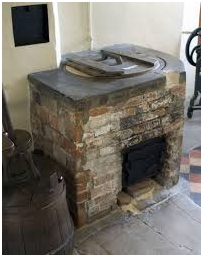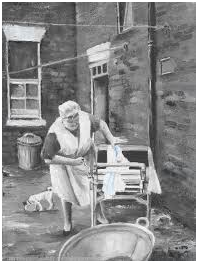In the Victorian era keeping the water hot fell to the task of the Wash Copper boiler. This was an essential part of the modern household kit at the time even into the 1900s. Without the Wash copper, you would not have had any access to hot or boiling water. Most of them were used for cleaning and washing.

There were two types available to the Victorian housewife. In older homes, the Wash copper wash built into a utility room or kitchen safely sealed away behind a tough brick exterior. The lid was either a copper one or some thick wood. The coal or if it was a more modern version gas or oil burner had some access via a metal gate cut into the brickwork where the fuel could be placed or ignited. Copper is an excellent conductor of heat so the water would soon be nice and warm or at boiling after a relatively short period of time.

The other type of copper boiler was one that could be lugged around the house wherever it was needed. Although the brick version was safe it was static meaning that you had to carry the water around in tin bucket or you washed the items there. The heat from the boiler could be intense, hence the brickwork and the mobile copper were the same. It had an enameled surface to protect and insulate the copper wash inside and this meant that it gave off pleasing warmth that it was apparently nice to rest an aching shoulder against it.
More expensive versions contained a tap or even a system that could vent off the steam into a flue. If it was a hot summer’s day this was a bit of a blessing. If the copper was used just for washing the family’s clothes the whole lot was dumped into the copper wash and “spun” around using a washing dolly. This was a stick with feet on the end that could turn the washing around. It was also used to extract the clothes so that they could be dried through a mangle.
Great care was taken to ensure that the copper wash was kept clean and tidy. Just as you would look to a Boiler Repair Gloucester business through a company like www.hprservicesltd.com/gloucester-boilers/boiler-repair-gloucester/, the copper was monitored for rust and grease. It was such a vital part of the house that nothing detrimental could be allowed to happen to it.


